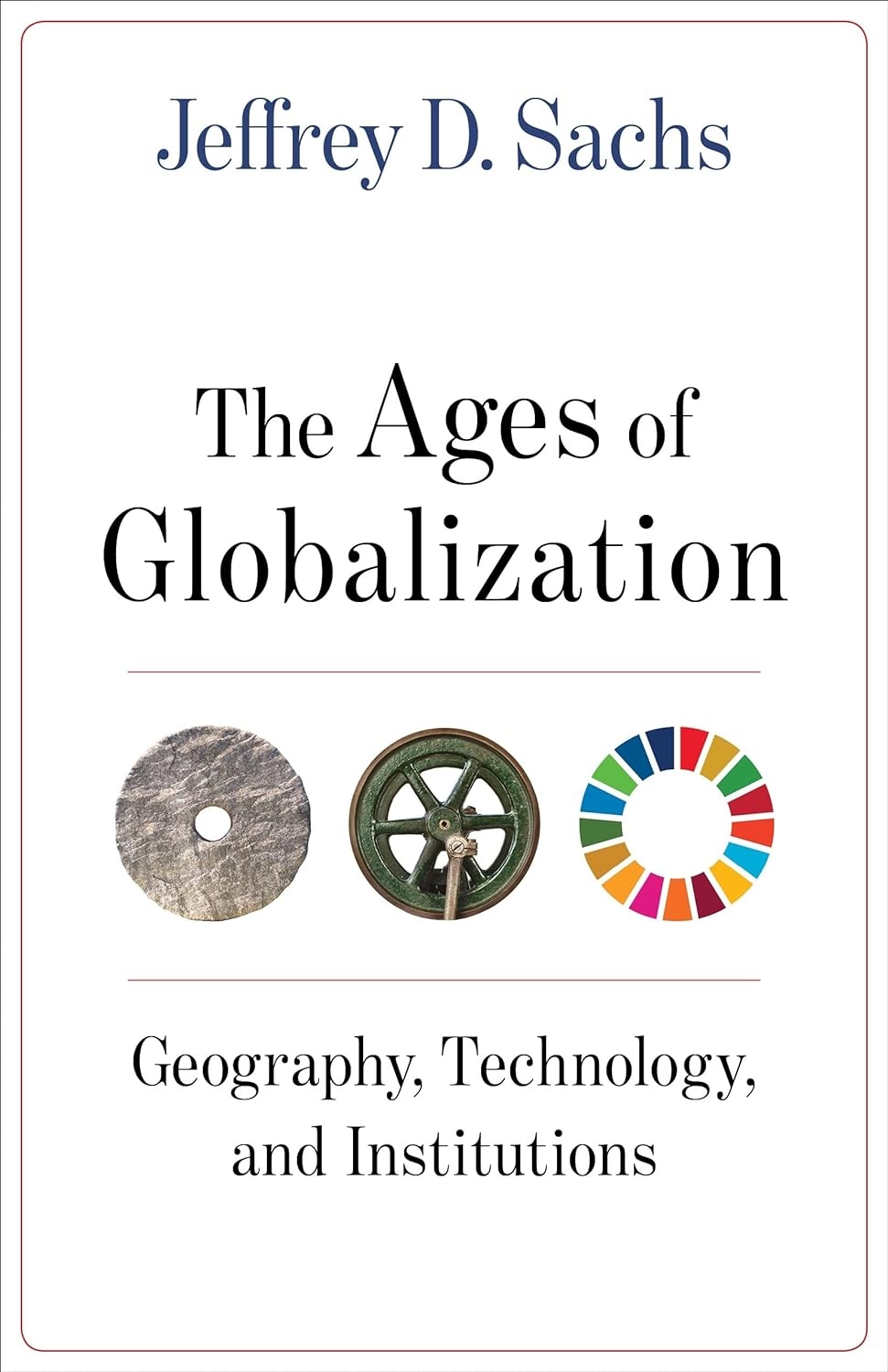Product details
Product description
Review
This romp through world history, by the famous economist Jeffrey Sachs, summarizes most of what you really need to know about the history of the last 70,000 years. Buy just this one book: it will let you throw away dozens of specialized books that you already own! — Jared Diamond, author of Guns, Germs, and Steel: The Fates of Human Societies
Understanding history can help steer the future, yet economic history is too often missing from the economics curricula. Sachs goes directly against this trend by providing a tour de force historical account on how humans, technology, and nature have interacted over the last 72,000 years! Key to the book’s message is that while technological progress has been exponential, our ability to benefit from it has always depended on the ways in which people have chosen to organize themselves. Today this means that while digital technologies provide endless possibilities, public policy and corporate governance decisions are key to determining who benefits. Sustainable and inclusive development will depend on our concrete forms of democratic participation, ethical standards, and the ability to create public spheres that allow us all to flourish. A must-read! — Mariana Mazzucato, University College London
Sachs has produced a brilliant, yet remarkably short, book on the biggest challenges now confronting humanity. He provides a compelling account of how geography, technology, and institutions have combined to shape globalization over 70,000 years, in seven distinct ages. Then he explains what humanity now has to do if it is to escape the environmental, social, and geopolitical calamities that its own staggering successes have brought so close. This book is essential reading. — Martin Wolf, Chief Economics Commentator, Financial Times
As my special advisor on the Sustainable Development Goals, Jeffrey Sachs consistently emphasized that the world can achieve sustainable development only through bold and forward-looking cooperation on a global scale. In his new panoramic history of globalization, Sachs shows why the imperative of peaceful cooperation is more crucial than ever. Our very survival as a species requires that we understand our common fate. This book will help us to reach that shared understanding. — Ban Ki-moon, former Secretary-General of the United Nations
The Ages of Globalization provides an unparalleled explanation of human development. This lucidly written book is a must read for anyone interested in how humanity has evolved and the root causes of the challenges we face today. Jeff Sachs’s magisterial and engaging book provides profound perspectives on human history, offering urgently needed insights to make sense of the present and offer an essential guide to our future. — Ian Goldin, author of Age of Discovery: Navigating the Storms of Our Second Renaissance
Economics is rediscovering historical perspectives, and thus its own roots. The result, in Jeffrey Sachs’s masterful hands, is eye-opening and refreshing. The Ages of Globalization is a tour de force through many millennia of human history, discerning patterns that help us understand in new ways our contemporary dilemmas. While the story he tells provides many reasons to be pessimistic about our future, Sachs also restores a sense of possibility with his steadfast refusal to think in ahistorical categories and his urgent plea to embrace the possibilities of the human condition. An important and empowering book. — Sven Beckert, coeditor of American Capitalism: New Histories
This dazzling book makes an invaluable contribution to the debate about the future of globalization by brilliantly summarizing humanity’s existential challenges and providing bold ideas for ensuring our survival. Sachs makes a persuasive argument that applying the concept of sustainable development must be today’s essential mission. His thoughtful proposals for reforming key international institutions, starting with the UN, merit particular attention. The Ages of Globalization is required reading for our times. — Vuk Jeremić, former president of the United Nations General Assembly
In this erudite yet accessible book, Jeffrey D. Sachs traces the history of modern humans from our migration from Africa some 70,000 years ago to today. In a pathbreaking account, he shows how geography, technology, and institutions drive change. His analysis is indispensable for understanding current global predicaments. A tour de force. — Prasannan Parthasarathi, Boston College
As it comes from Jeffrey D. Sachs, I had expected this book to be analytical, punchy, and readable, and so it is. But it is a pleasure to be able to report that it is also a book by a superstar economist that takes both history and geography seriously and that allows the past, with all its complexities and contingencies, to speak for itself. Impressively broad in both temporal and geographical scope, this is a masterpiece of concision and a great introduction to global economic history. — Kevin O’Rourke, author of A Short History of Brexit: From Brentry to Backstop
At a time when the foundations of the world economic order are being challenged, we must rely on the knowledge accumulated throughout history to make wiser choices for the future of our societies. In The Ages of Globalization, Jeffrey Sachs offers a superb and unique historical and analytical framework for understanding the process of globalization, highlighting its dynamic nature and addressing its social and economic implications. From the Paleolithic Age to the current digital age, this book examines the interplay of geography, technology, and institutions to achieve a comprehensive explanation of how globalization emerges and evolves. Analysts, policy makers, social and political leaders, interested citizens, and anyone concerned with the future of the global economy can draw invaluable lessons from this book. — Felipe Larraín B., former minister of finance of Chile
The Ages of Globalization is not just a book for the modern citizen. It is an essential survival kit for the twenty-first century. At the same time that humanity was amassing wealth, it was also creating the means of its own destruction. Now we are facing forces none of us can counter alone, such as climate change and environmental degradation. Sachs’s call for action resonates with vigor and urgency. With this book, we can better explore, learn, and act. — Miroslav Lajčák, minister of foreign and European affairs of the Slovak Republic
Few scholars have the breadth of knowledge with which to cogently weave insights from such wide-ranging fields such as agronomy, economics, archaeology, anthropology, and engineering to recount the layered story of how globalization and development unfolded. As always, Sachs is a treat to read. — Gordon McCord, University of California, San Diego
An authoritative account of our “shared,” increasingly interdependent human journey. ―
Kirkus ReviewsThis masterful history of the human experience of global interconnectedness begins in the Paleolithic Age and ends in today’s COVID-19 pandemic. Sachs makes a powerful case that the globalizing forces creating our increasingly interdependent world are deeply rooted in the human condition and that they are forces―for better and worse―that are here to stay. — G. John Ikenberry ―
Foreign AffairsSachs wears his own extensive reading lightly. He’s a very clear writer, too, and the book has some lovely (colour) charts and maps. ―
Diane Coyle, The Enlightened Economist










Saurav Pal –
Most of us is already familiar with Dr. Jeff Sachs as a world famous economist and a pioneer in sustainabilty. He already authored or co-authored some of the books on economics. This time he illuminated the economic history of the world with a focus on globalization in seven different phases! Rich in info with the signature writing style, this work by Dr. Sachs destined to be a classic! I recommend this book to all those who are interested to know our economic history. This book featured colored maps and images which made it even more attractive and easy to understand one.
Jaume Josa –
De lectura obligada para mejor comprender el mundoMe ha gustado que se explique la historia desde el Paleolítico, con diversos imperios coexistiendo, desde los Han en Asia, los Griegos, Romanos. Esta coetaniedad me parece muy importante.Recomiendo el libro a cualquier persona deseosa de comprender el mundo desde una visión más global, fuera del eurocentrismo habitual.
Jesus Elias –
Historia economíaExcelente libro sobre la historia humana y los factores que la marcaron. Altamente recomendable
Matt L. Pimentel, Ph.D. –
Short and to the point.Dr. Sachs’ easy to read and follow book is informative and almost a “Cliff’s Notes” version of the epic, “Guns, Germs, and Steel: The Fates of Human Societies,” by Jared Diamond. Sachs delineates societies in to seven sections, from the Paleolithic Age (around 70,000 BCE) to the current Digital Age (21st century). Sachs correctly postulates the advantage and lineage of societies describing the migration of humans from the Southern aspect of Africa to Europe, Asia and to North and South America, through the Beringia Bridge between Eastern Russia and the Western aspect of North America. He details through the ages: Paleolithic, Neolithic, Equestrian (his version of copper and bronze age), Classical, Ocean, Industrial, and the Digital. Sachs, as did Diamond, described the advantages of the so-called the “lucky latitudes,” because, “they have been home to humanity’s greatest technological and economic progress.” These coordinates are from 25 degrees North to 45 degrees North in Eurasia. As an extrapolation, the fertileness of agriculture and animal husbandry was done, centuries later in the Western Hemisphere’s aspect. As a very interesting fact, North and South America’s advancements were delayed because our ancestors consumed the horse during the Paleolithic Age, instead of keeping a few around. Once the Beringia Bridge disappeared around approximately 14,500 years ago, the Eastern and Western Hemispheres were separated from all communication until around the 12th to 15th century. It was the lack of the horse, which was vital in transport, communication, and security, that delayed the simultaneous expanse on the Western Hemisphere side. I will not divulge any more interesting nuggets of information concerning this well-written work. Sachs concludes that are three great risks of preventing sustainable development during our current Digital Age. They are the increasing global inequality between individuals, our global environmental crisis, and the risk of war, especially between China and the United States.
Riccardo P. –
A brand new vision of GlobalizationA great book with a complete historical view of the globalization of the world
Hermes –
Economics is only Sachs’s day jobGrand sweep of human history, not just economic. Interdisciplinary, borrows from others, with credit. Loyalty to our group, aggression to outsiders, but “our group” keeps getting broader and broader, albeit not without reversals, two steps forward, one back. Sachs developed into a philosopher in the ancient Greek sense, de-compartmentalising knowledge to wisdom. His lectures on the morality and sustainability of modern capitalism, finding the right mix of cooperation and competition are absorbing, he must put them in a next book and I look forward to it.